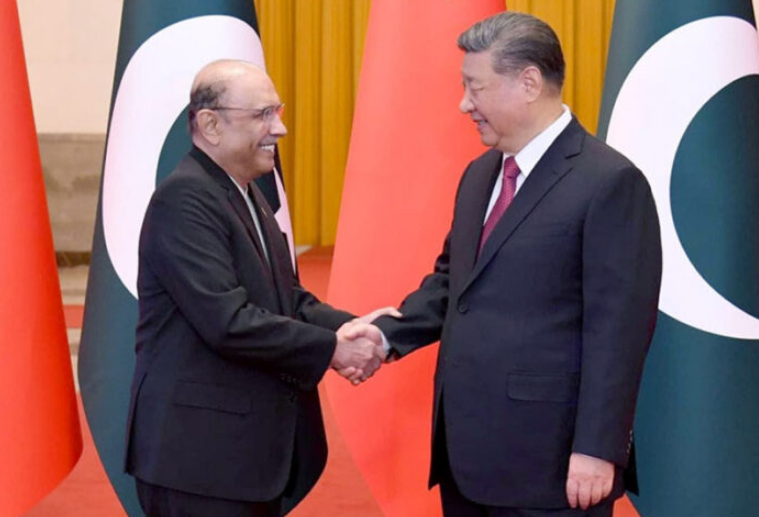Beijing (Web Desk/Agencies): Pakistan and China have agreed to strengthen bilateral cooperation in multiple sectors including counter-terrorism, defence, agriculture, information technology and others, reiterating that the attempt to undermine or disrupt bilateral ties were bound to fail.
The bilateral ties and cooperation were discussed as President Asif Ali Zardari, during his ongoing five-day state visit to China, met with President Xi Jinping, Premier Li Qiang, Chairman of the Standing Committee of the National People’s Congress Zhao Leji, according to a joint statement issued by the Foreign Office (FO) encompassing the discussions and agreements reached during the visit.
Over the course of the visit, the two sides signed numerous agreements, covering various aspects such as trade, scientific collaboration, and infrastructure projects, particularly under the umbrella of the China-Pakistan Economic Corridor (CPEC).
Both nations committed to advancing this partnership, with a focus on key areas like high-quality development, security, and the overall well-being of their citizens.
One of the focal points of the discussions was the continued evolution of CPEC, with both sides vowing to enhance the corridor's infrastructure and expand cooperation in sectors like agriculture, technology, and industry.
Plans were also laid out for developing additional frameworks for future trade, technology, and communications exchanges. They agreed to explore deeper cooperation on emerging technologies like artificial intelligence and big data, as well as work together on education, media, and other cultural initiatives aimed at fostering mutual understanding.
Another significant issue addressed was the promotion of economic liberalization, with a particular emphasis on the Phase-II of the China-Pakistan Free Trade Agreement.
Both countries expressed a strong commitment to exploring mutual trade advantages and working toward a framework that benefits both nations. Additionally, efforts to continue expanding the CPEC projects were discussed, ensuring that these initiatives align with Pakistan’s goals for sustainable economic growth, job creation, and improved living standards.
On the security front, the two sides reaffirmed their commitment to combating terrorism in all its forms.
President Zardari assured China of Pakistan’s dedication to ensuring the safety and security of Chinese nationals and projects in Pakistan. This included further efforts to investigate and bring to justice those responsible for attacks involving Chinese personnel.
The two countries pledged to continue enhancing cooperation in counter-terrorism operations, both bilaterally and through multilateral channels.
The talks also touched on the importance of peace and stability in South Asia.
Pakistan and China reiterated their shared position on resolving disputes in the region, particularly the longstanding Jammu and Kashmir issue, which remains a contentious matter in the bilateral discussions.
The two sides agreed that the dispute must be addressed peacefully and in accordance with international norms, including the United Nations (UN) charter and Security Council resolutions.
In addition to the geopolitical concerns, the two countries explored avenues to expand cooperation in social sectors, particularly healthcare and education.
They discussed projects that would benefit the citizens of both nations, such as improving access to medical care and enhancing education, especially for younger generations.
The two leaders expressed a shared interest in deepening their people-to-people exchanges, focusing on increasing the number of Pakistani students learning Chinese language and providing opportunities for Chinese companies to expand their operations in Pakistan.
As part of the visit, President Zardari participated in discussions surrounding the upgradation of the Karakoram Highway, a key infrastructure project that will improve connectivity between the two nations.
Furthermore, the inauguration of the new Gwadar International Airport was hailed as a significant milestone in enhancing Pakistan’s strategic role in regional trade and logistics.
Both sides acknowledged their longstanding strategic partnership and the role of China’s support for Pakistan’s economic stability, expressing a desire to continue deepening ties in various sectors.
The two countries also highlighted their commitment to improving international cooperation, working together to address global challenges, and promoting the well-being of developing nations in multilateral forums like the United Nations.
Additionally, China reaffirmed its support for Pakistan’s territorial integrity and national sovereignty, particularly in matters relating to Kashmir, and reiterated its strong opposition to any unilateral actions that might escalate tensions in the region.
The two sides emphasized the importance of maintaining a peaceful, stable South Asia and pledged to continue efforts for regional security.
President Zardari invited President Xi Jinping to visit Pakistan at a mutually convenient time, further solidifying the close and strategic ties between the two countries, and looking ahead to future collaboration and mutual benefit.


